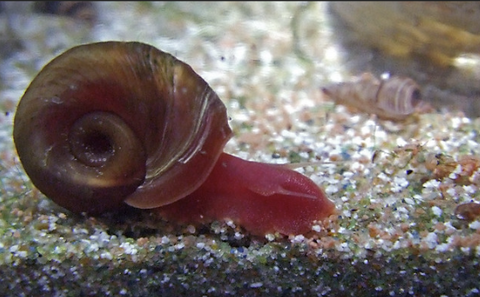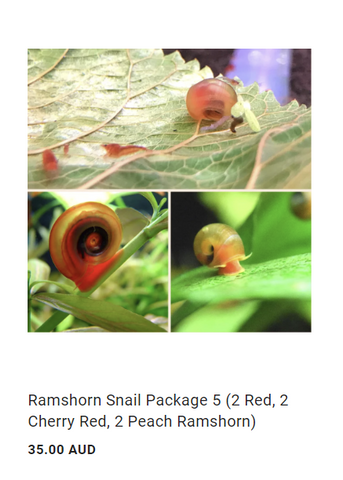Ramshorn Snails - Pros And Cons Of Keeping Them
Ramshorn Snails - Pros And Cons Of Keeping Them
Having Ramshorn snails as pets.
Keeping Ramshorn snails as pets can be a fun and exciting addition to your community tank or even a tank specifically designed for shrimp or snails. These snails have a great ability to keep your tank clean by munching on leftover food, decaying plants, debris, and soft algae that tend to build up on hard surfaces.
Ramshorn snails are quite fascinating to aquarists and can bring a lot of interest to your tank. They can spend hours scavenging for food, using their rubber-like bodies to move gracefully among thin leaves, dangling from stems, and reaching out as they explore different surfaces. With baby Ramshorn snails, you can even see inside their bodies as they eat, thanks to their thin and translucent shells.
Identifying and finding Ramshorn snails in pet stores can be a bit tricky. They go by various names and come in different varieties. You might find them labeled as regular Ramshorn Snails, Red Ramshorn Snails, or just Ramshorn Snails. There are also rarer and more expensive varieties like the Blue Ramshorn Snail and Pink Ramshorn Snail.
Healthy Ramshorn snails are active, constantly on the move, and frequently searching for food in the tank. A healthy snail will have a spiral-shaped shell, resembling a flat coil of wire around a garden hose. Make sure the snail has tentacles sprouting from the top of its head, indicating its well-being. Avoid snails that are motionless at the bottom of the tank, floating around, or stuck on surfaces. Also, it's best not to keep snails in a display tank with other snails that are dead, dying, sick, or unhealthy.

Want to keep some RED-RAMSHORN GUYS? Check it out here.
Ramshorn snail size and age.
When considering the size of a Ramshorn Snail, we usually refer to the size of its shell rather than its body or foot size. In pet stores, a young Ramshorn Snail can measure about 1/4 inch in length. As the snail grows older, its shell size increases. Generally, the larger the shell, the older the snail. With the right conditions and a bit of luck, Ramshorn snails can grow larger than a coin and sometimes even bigger.
The size of the snail also refers to the width of its shell. As the shell grows longer, it becomes wider. The narrowest part of the shell ring is closest to the top, while the widest part is closest to the opening.
Taking care of Ramshorn snails is relatively easy.
Caring for Ramshorn Snails involves considering tank size, habitat, water conditions, diet, growth rate, lifespan, and reproduction. Fortunately, these snails are beginner-friendly and don't require complicated care.
Tank Size & Water Parameters.
Ramshorn snails can thrive in various tank sizes, from small 20-liter tanks to much larger ones, as long as you follow the appropriate fish-to-tank ratio. While they aren't notorious escape artists like some other snail species, it's still a good idea to cover the tank to prevent any unexpected adventures.

Ramshorn Snail Package 4 (1 Red, 1 Leopard, 1 Cherry Red).
Habitat.
Ramshorn snails can adapt to different habitats, but they seem to prefer tanks with a wide variety of plants. Aquatic plants provide a source of food for snails as they release dead or decaying plant matter into the water. Tanks with live plants are never "too clean," which makes them ideal for Ramshorn Snails. These snails also enjoy exploring rock pools, caves, and other interesting spots in the tank.
Water conditions.
Ramshorn Snails are highly adaptable and can thrive in various water conditions. They can do well in tanks with clear, moderately flowing water, as well as in murkier tanks. However, it's important to ensure the water in the tank is well-aerated, oxygenated, and maintains stable parameters. Ramshorn snails prefer tanks that avoid sudden changes in conditions.
Regularly check the water in the tank when keeping Ramshorn Snails. Ensure the Ammonia and Nitrite levels are at 0 ppm, and control Nitrate levels and organic matter buildup through regular partial water changes. When using pesticides or plant fertilizers, exercise caution as some ingredients can harm shellfish. And most importantly, avoid any presence of copper, even in small amounts, as it can be fatal to snails.

Food & Growth of Ramshorn Snail.
What do Ramshorn snails eat? These snails spend a significant amount of time on hard surfaces, scouring for food. Their diet includes dead or decaying plants, soft algae, leftover food, and discarded matter. Ramshorn Snails should be fed a variety of fish flakes, pellets, bottom pellets, algae plates, and calcium-rich supplements. Calcium is particularly crucial for the healthy growth of their shells. When feeding, offer small amounts that the snail can consume within 5 minutes.
Ramshorn Snails may also eat dead fish, snails, or shrimp. While they will consume these, it's best to remove any carcasses to prevent an increase in ammonia levels and maintain good water quality. Ramshorn snails may even enjoy eating the shells of bamboo or Amano shrimp. Some snail owners allow the snails to feed on the shells for a while, as it provides them with essential minerals. Once they finish, remove any remaining shells from the tank.
Now we think your tank needs a lovely friend like Ramshorn Snails. So, check it out here and bring some ramshorn home with you.
Algae as a food source.
Ramshorn Snails particularly enjoy soft green algae that grow on hard surfaces like the aquarium glass, filter doors, gravel, decorations, and slow-growing leaves. They may also show interest in soft brown algae that grow just below the substrate line. Hungry Ramshorn Snails can even dig about an inch below the substrate to feast on algae accumulated on the glass.

Fresh vegetables.
Fresh vegetables are often overlooked as a food source for Ramshorn Snails. Green lettuce leaves, spinach leaves, and slices of zucchini, among other options, make good choices. Although you can add a small amount of fresh vegetables directly to the tank, it's advisable to blanch them quickly to soften them before feeding. Experiment with a variety of options to see which vegetables your snails prefer.
Providing a balanced diet of detritus, aquatic algae, vegetables, and commercial supplements will ensure the rapid and steady growth of your Ramshorn Snails. Calcium, in particular, plays a vital role. If their calcium intake is adequate, their shells will grow thick and strong without any cracks. Inadequate or insufficient calcium in their diet will result in slower growth and thinner shells with small cracks. Therefore, it's important to feed your Ramshorn Snail, a commercial food supplemented with calcium.

Flash Sale 10 X Cherry Red Ramshorn Snails.
Ramshorns & Live Plants.
Regarding live plants, opinions vary among aquarists when it comes to Ramshorn Snails and their impact on the plants. Some say Ramshorn Snails eat live plants, while others rarely face problems. The extent to which Ramshorn Snails consume plants depends on the plant's strength and the snail's feeding behavior.
Healthy and well-fed Ramshorn snails typically have a lifespan of about a year, although some may live longer with proper care.
When a Ramshorn snail dies, it will likely lie motionless at the bottom of the tank. If it remains still for an unusually long time, it may have passed away. Over time, the body will decompose, and the shell may start to thin and develop holes. While it's generally recommended to remove dead organisms from the tank promptly, some people prefer to let the shells dissolve in the water to release their minerals back into the tank.
Reproduction of Ramshorn snails can be a challenge for pet owners. These snails can reproduce rapidly and abundantly. They lay their eggs in clusters on hard surfaces shortly after being released into the tank. The egg clusters are transparent and jelly-like, containing multiple individual eggs.
You may notice these clusters on the aquarium glass, but there are likely more hidden on other surfaces. Within a few days, the small dots inside the clusters become less transparent and turn white as the snails develop. Soon, tiny white snails will wriggle out of the eggs and leave the nest. One way to control the reproduction of Ramshorn Snails is by managing their food supply. The more they eat, the more they reproduce, assuming other factors remain constant.
Ramshorn snails come in two main skin colors: black and red. Unlike snails with blue or black skin, red Ramshorns have blood containing hemoglobin and lack the black pigment called "melanin." As a result, their skin appears red, reflecting their blood color. Their shells can range from various shades of brown to deep black, with some even being translucent. The darker colors are believed to be influenced by nutrients commonly found in ponds or marshes, which are not typically present in aquariums.

Ramshorn Snail Package 5 (2 Red, 2 Cherry Red, 2 Peach Ramshorn)
There are several benefits to keeping Ramshorn snails. Many aquarium enthusiasts consider them a valuable addition to the tank's cleaning crew. They have a voracious appetite and can quickly eliminate algae growth. They also help clean the surface of plants and scavenge dead leaves, algae, and other organic matter.
However, there are also some drawbacks to consider. Due to their hermaphroditic nature, Ramshorn snails can multiply rapidly and become challenging to control. They produce a significant amount of feces, which can impact water quality. In some cases, they may eat live plants and consume shrimp food, potentially disturbing the shrimp in the tank.

Rare Ramshorn Snail Package ( 1 Pink + 1 Cherry Red + 1 Blue )
Another important point to note is that red snails are known to carry various types of parasitic flukes that can be transmitted to fish. These flukes are sometimes considered intermediate hosts, so isolating snails for at least a month can help prevent disease transmission.
To control Ramshorn snail populations, it's crucial to avoid overfeeding. Overfeeding is the primary cause of snail outbreaks. If you notice an increasing number of snails in your tank, reducing the amount of food you provide can make a significant difference. Additionally, some aquarium fish, such as certain species of Botia, clownfish, betta fish, crayfish, and apple snails, can help control Ramshorn snails by preying on them.
Now that you have learned about Ramshorn snails and their care requirements, it's time to decide if they are the right choice for your tank. Adding these snails can bring diversity and enjoyment to your aquarium, as they are fascinating creatures to observe. With proper care, there are no downsides to choosing Ramshorn snails as long as they are compatible with other tank inhabitants.
At the Micro Aquatic Shop, we are passionate about snails and cannot stop praising their unique qualities. They are adorable, fun, and captivating to watch. By introducing any of the freshwater snails mentioned in our list, you can give your tank a refreshing boost and experience the joys of owning different aquatic creatures.












Leave a comment
Please note, comments need to be approved before they are published.